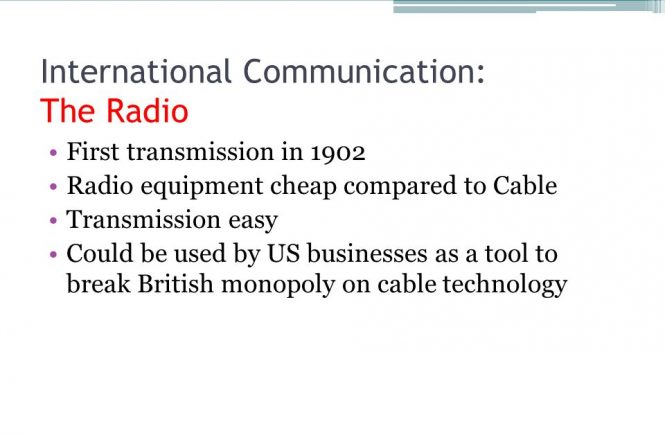As with other new technologies, Western countries were the first to grasp the strategic implications of radio communication after the first radio transmissions of the human voice in 1902. Unlike cable, radio equipment was comparatively cheap and could be sold on a mass scale. There was also a growing awareness among American businesses that radio, if properly developed and controlled, might be used to undercut the huge advantages of British-dominated international cable links (Luther, 1988). They realized that, while undersea cables and their landing terminals could be vulnerable, and their location required bilateral negotiations between nations, radio waves could travel anywhere, unrestrained by politics or geography.
At the 1906 international radiotelegraph conference in Berlin, 28 states debated radio equipment standards and procedures to minimize interference. The great naval powers, who were also the major users of radio (Britain, Germany, France, the USA and Russia), had imposed a regime of radio frequency allocation, allowing priority to the country that first notified the International Radiotelegraph Union of its intention to use a specific radio frequency (Mattelart, 1994).
As worldwide radio broadcasting grew, stations that transmitted across national borders had, in accordance with an agreement signed in London in 1912, to register their use of a particular wavelength with the international secretariat of the International Radiotelegraph Union. But there was no mechanism for either assigning or withholding slots; it was a system of first come, first served. Thus the companies or states with the necessary capital and technology prevailed in taking control of the limited spectrum space, to the disadvantage of smaller and less developed countries (Hamelink, 1994).
Two distinct types of national radio broadcasting emerged: in the USA, the Radio Act of 1927 enshrined its established status as a commercial enterprise, funded by advertising, while the British Broadcasting Corporation (BBC), founded in 1927, as a non-profit, public broadcasting monopoly, provided a model for several other European and Commonwealth countries (McChesney, 1993).
As the strongest voice in the World Radio Conference in Washington in 1927, private companies helped to write an agreement that allowed them to continue developing their use of the spectrum, without regard to possible signal interference for other countries. By being embodied in an international treaty, these provisions took on the character of ‘international law’, including the principle of allocating specific wavelengths for particular purposes (Luther, 1988). A major consequence of this conference was to reinforce US and European domination of the international radio spectrum. However, it was the Soviet Union which became the first nation to exploit this new medium for international broadcasting.
